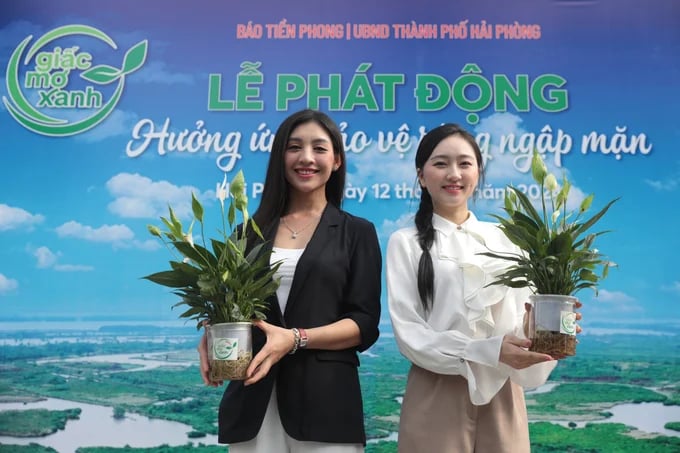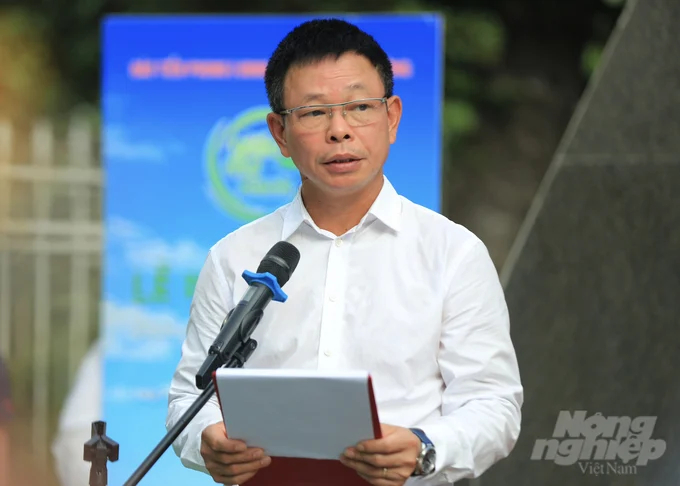May 19, 2025 | 23:24 GMT +7
May 19, 2025 | 23:24 GMT +7
Hotline: 0913.378.918
May 19, 2025 | 23:24 GMT +7
Hotline: 0913.378.918

2,600 trees will be planted in two batches, according to the tidal schedule. Photo: Dinh Muoi.
On the morning of August 12, Tien Phong Newspaper coordinated with the Department of Agriculture and Rural Development of Hai Phong to launch a response to protect mangrove forests in K15 Pier, Do Son District, Hai Phong City.
At the event, Tien Phong Newspaper presented 2,600 trees, including 1,300 mangrove trees and 1,300 trang trees, to the Department of Agriculture and Rural Development of Hai Phong. These are two native tree species with good growth and resistance to local soil and climate conditions.
The area selected for planting trees is the alluvial ground outside the Viet My lagoon dike, in Vinh Quang commune, Tien Lang district - a coastal alluvial ground area without forests, located in the local forest protection and development plan.
The mangrove planting will be carried out in two phases based on the August tidal calendar. Phase 1 is expected to plant 1,300 mangrove trees from August 17-19. Phase 2 is scheduled to plant 1,300 mangrove trees from August 20-23.
Mr. Phung Cong Suong, Editor-in-Chief of Tien Phong Newspaper, shared that mangrove forests play a vital role in the ecosystem and environment, not only contributing to protecting biodiversity, preventing coastal storms, regulating the climate, reducing temperature and temperature amplitude, mangrove forests are considered the best lungs to absorb CO2, many times more than terrestrial forests, playing an essential role in limiting global warming.
Mr. Suong hopes that the event will add more green to Hai Phong City, contributing to protecting the environment and adapting to climate change in the context of increasingly unusual and severe natural disasters. The spirit of green living, joining hands to protect our environment today and for future generations, will be spread.

Journalist Phung Cong Suong, Editor-in-Chief of Tien Phong Newspaper, spoke at the event. Photo: Dinh Muoi.
Nguyen Ngoc Tuat, Deputy Director of the Hai Phong Department of Agriculture and Rural Development, said the city's forest area is smaller than some provinces in the Central and Northern regions. Still, it has a system of coastal mangrove forests stretching over more than 2,800ha.
Forest protection, in general, and mangrove protection are critical tasks and must be considered a goal and essential content of sustainable development.
At the same time, it must be reflected in strategies, planning, plans, and socio-economic development projects of each locality with forests, aiming to restore degraded ecosystems, gradually improve forest quality, and preserve rare genetic resources of our country's forests.
After afforestation, protection work is maintained regularly until November 31, 2024, by placing signs prohibiting exploitation and fishing activities in the planting area; preventing acts of cutting, destroying forests, encroaching on forests and preventing harmful organisms and pests; strictly banning the construction of dams, nets to block the flow in the planted forest for aquaculture, fishing or combined production.
Plant care is organized periodically every 15-20 days to check, erect fallen trees, tie tree support stakes, hill up the roots, and watch over people and vehicles to prevent them from entering the planted forest area.
Translated by Huong Giang

(VAN) This was the assessment shared by experts at the workshop titled 'Assessing the Role and Potential of Low-Emission Rice Production Systems in Vietnam,' held on the morning of May 19.

(VAN) Cai Rong Port is the fisheries control center of Quang Ninh, helping to monitor fishing vessels, combat IUU fishing, and remove the EC's 'yellow card'.

(VAN) The German Agricultural Society (DLG) explores the possibility of establishing a mechanization service center in Vietnam’s Mekong Delta to support farmers in accessing and utilizing advanced machinery.

(VAN) On May 16, the Department of Water Resources Management, in collaboration with the Food and Agriculture Organization of the United Nations (FAO), held a signing ceremony for the GEF-8 project document.

(VAN) Food safety, mechanization, vocational training, and market opening are key areas of cooperation expected between the Vietnamese Government and the Federal Republic of Germany.

(VAN) Deputy Minister Nguyen Quoc Tri also expressed his hope that Cuba will soon overcome its current challenges, attain food security, and further expand cooperation with Vietnam.

(VAN) The project contributes to enhancing the resilience of communities vulnerable to the impacts of climate change, with a primary focus on local women.